Pheidole quadrispinosa
| Pheidole quadrispinosa | |
|---|---|

| |
| Scientific classification | |
| Kingdom: | Animalia |
| Phylum: | Arthropoda |
| Class: | Insecta |
| Order: | Hymenoptera |
| Family: | Formicidae |
| Subfamily: | Myrmicinae |
| Tribe: | Attini |
| Genus: | Pheidole |
| Species: | P. quadrispinosa |
| Binomial name | |
| Pheidole quadrispinosa (Smith, F., 1865) | |
| Synonyms | |
| |
Identification
Distribution
Distribution based on Regional Taxon Lists
Indo-Australian Region: Indonesia (type locality), New Guinea.
Distribution based on AntMaps
Distribution based on AntWeb specimens
Check data from AntWeb
Countries Occupied
| Number of countries occupied by this species based on AntWiki Regional Taxon Lists. In general, fewer countries occupied indicates a narrower range, while more countries indicates a more widespread species. |

|
Estimated Abundance
| Relative abundance based on number of AntMaps records per species (this species within the purple bar). Fewer records (to the left) indicates a less abundant/encountered species while more records (to the right) indicates more abundant/encountered species. |

|
Biology
Castes
Images from AntWeb
 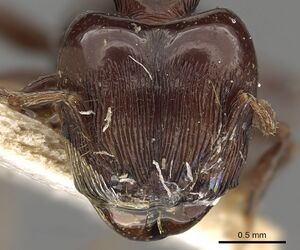 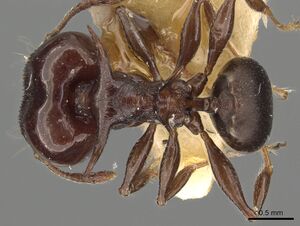 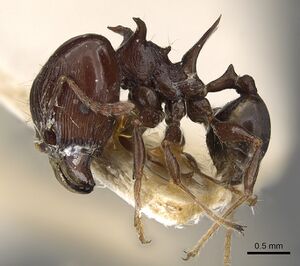
| |
| Worker (major/soldier). Specimen code casent0901321. Photographer Ryan Perry, uploaded by California Academy of Sciences. | Owned by NHMUK, London, UK. |
 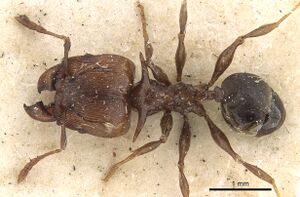 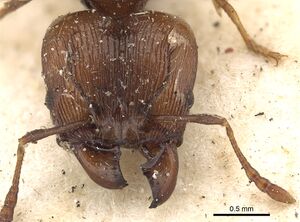 
| |
| Type of Pheidole armatus. Worker (major/soldier). Specimen code casent0901399. Photographer Ryan Perry, uploaded by California Academy of Sciences. | Owned by OUM, Oxford, UK. |
  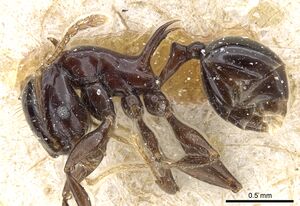 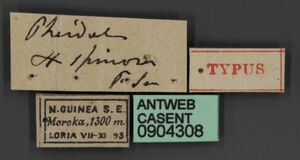
| |
| Syntype of Pheidole quadrispinosa. Worker. Specimen code casent0904308. Photographer Z. Lieberman, uploaded by California Academy of Sciences. | Owned by MSNG, Genoa, Italy. |
Nomenclature
The following information is derived from Barry Bolton's Online Catalogue of the Ants of the World.
- armatus. Pheidolacanthinus armatus Smith, F. 1865: 75, pl. 4, fig. 8 (s.) NEW GUINEA. Junior synonym of quadrispinosa: Donisthorpe, 1938a: 144.
- quadrispinosa. Myrmica quadrispinosa Smith, F. 1865: 72, pl. 4, fig. 6 (w.) INDONESIA (Salwatty I.). Donisthorpe, 1941b: 38 (q.m.). Combination in Pheidole: Mayr, 1878: 677; in P. (Pheidolacanthinus): Emery, 1921f: 82. Senior synonym of smithi (unnecessary replacement name): Dalla Tore, 1893: 95; of armatus: Donisthorpe, 1938a: 144.
- smithi. Pheidole smithi Emery, 1887b: 464. [Unnecessary replacement name for quadrispinosa.] Junior synonym of quadrispinosa: Dalla Torre, 1893: 95.
The following notes on F. Smith type specimens have been provided by Barry Bolton (details):
Myrmica quadrispinosa
Holotype worker minor in Oxford University Museum of Natural History. Labelled “S” (= Salwatty I.).
Pheidolacanthinus armatus
Holotype worker major in Oxford University Museum of Natural History. Labelled “S.” (= Salwatty I.).
Description
References
- Dalla Torre, K. W. von. 1893. Catalogus Hymenopterorum hucusque descriptorum systematicus et synonymicus. Vol. 7. Formicidae (Heterogyna). Leipzig: W. Engelmann, 289 pp. (page 95, senior synonym of smithi (unnecessary replacement name))
- Donisthorpe, H. 1938a. Five new species of ant, chiefly from New Guinea. Ann. Mag. Nat. Hist. 11(1): 140-148 (page 144, senior synonym of armatus)
- Donisthorpe, H. 1941b. New ants from Waigeu Island, New Guinea, and the Solomons. Entomologist 74: 36-42 (page 38, queen, male described)
- Emery, C. 1921c. Hymenoptera. Fam. Formicidae. Subfam. Myrmicinae. [part]. Genera Insectorum 174A:1-94 94: 1-94 + 7 (page 82, Combination in P. (Pheidolacanthinus))
- Mayr, G. 1879. Beiträge zur Ameisen-Fauna Asiens. Verh. K-K. Zool.-Bot. Ges. Wien 28: 645-686 (page 677, Combination in Pheidole)
- Smith, F. 1865a. Descriptions of new species of hymenopterous insects from the islands of Sumatra, Sula, Gilolo, Salwatty, and New Guinea, collected by Mr. A. R. Wallace. J. Proc. Linn. Soc. Lond. Zool. 8: 61-94 (page 72, pl.4, fig. 6 worker described)
References based on Global Ant Biodiversity Informatics
- Donisthorpe H. 1947. Pheidole (Pheidolacanthinus) striatus sp. n. from New Guinea, with notes on the subgenus Pheidolacanthinus F. Smith (Hym., Formicidae). Entomologist's Monthly Magazine 83:172-174.
- Donisthorpe, Horace. 1941. New Ants From Waigeu Island, New Guinea, And the Solomons. The Entomologist (74):36-43.
- Donisthorpe, Horace. 1941. New Ants from Waigeu Island, New Guinea and the Solomons. The Entomologist. 74:36-43.
- Donisthorpe, Horace. 1943. The Ants of Waigeu Island, North Dutch New Guinea. The Annals and Magazine of Natural History 11 (10): 433-475.
- Emery C. 1887. Catalogo delle formiche esistenti nelle collezioni del Museo Civico di Genova. Parte terza. Formiche della regione Indo-Malese e dell'Australia (continuazione e fine). [concl.]. Ann. Mus. Civ. Stor. Nat. 25(5): 427-473.
- Emery, C. "Catalogo delle formiche esistenti nelle collezioni del Museo Civico di Genova. Parte terza. Formiche della regione Indo-Malese e dell'Australia (continuazione e fine)." Annali del Museo Civico di Storia Naturale Giacomo Doria (Genova) (2) 5, no. 25 (1887): 427-473.
- Smith F. 1865. Descriptions of new species of hymenopterous insects from the islands of Sumatra, Sula, Gilolo, Salwatty, and New Guinea, collected by Mr. A. R. Wallace. Journal and Proceedings of the Linnean Society of London. Zoology 8: 61-94.
- Viehmeyer H. 1912. Ameisen aus Deutsch Neuguinea gesammelt von Dr. O. Schlaginhaufen. Nebst einem Verzeichnisse der papuanischen Arten. Abhandlungen und Berichte des Königlichen Zoologischen und Anthropologische-Ethnographischen Museums zu Dresden 14: 1-26.

